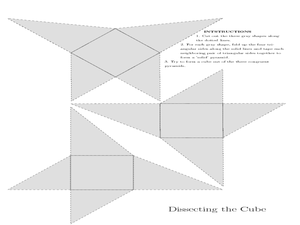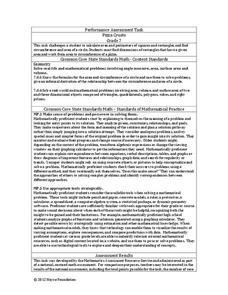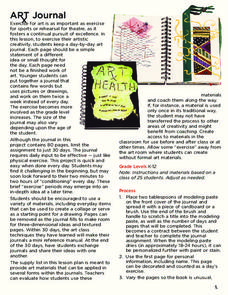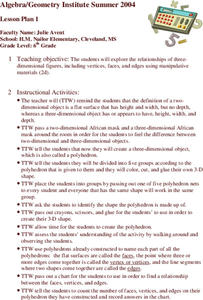Curated OER
Tiling the Plane
Students use pattern blocks and triangular grid paper to review shape names, be introduced to the concept of a tiling of the plane, and determine which pattern blocks tile the plane. They are asked: "Have you ever seen a floor or a wall...
Curated OER
Dimensional Flower Garden
Young scholars relate the colors in a garden to those in a rainbow by creating a multicolored three-dimensional garden portrait. They read, "Planting a Rainbow" by Lois Ehlert, then construct their garden with colored paper on white...
Curated OER
Nets of 3-Dimensional Figures #2
In this nets of figures worksheet, students determine which given shapes will make a shown net, then name the shapes uses. A reference web site is given for additional activities.
Curated OER
Roger Brown
Students examine and discuss the use of symmetry in a painting by the artist Roger Brown. They draw a geometric shape, divide it with a line of symmetry, and create a painting using the geometric shapes demonstrating symmetry.
Curated OER
Building With Triangles
Students participate in a unit on triangles. Through the unit they explore different way to make basic shapes using triangles. They also examine the basic properties of triangles and the relationships among basic geometrical shapes in...
Mathed Up!
Nets, Plans, and Elevations
A dimensional resource teaches viewers to recognize 2-D views of 3-D objects and how to match nets with their 3-D figures. Individuals draw different views of three-dimensional objects including views from the front, side...
Curated OER
Dissecting the Cube
Students investigate the volume of cones. In this geometry lesson, students define the formula to find the volume of cones. They define the concept of having to dissect a three dimensional figure and find the volume.
American Institute of Physics
African American Inventors in History
A two-part lesson plan introduces young historians to the work of famous African American inventors. Groups first research and develop a presentation of an inventor that includes biographical information and information about one of...
Curated OER
Figurative Slot Sculptures
Middle schoolers create 3-dimensional works of art in the form of slot sculptures. I love this lesson, because it exposes students to a completely different form of art. Everything you need to do to successfully-implement this lesson is...
Curated OER
Halves and Fourths
Young mathematicians may not love fractions, but do they love sandwiches? How about cake? Use this visual fractions activity to represent fractions in a relatable way. Scholars start by coloring segmented shapes to indicate halves and...
Dick Blick Art Materials
“Rhythm in Layers”
Young artists learn to build rhythm into a design by repeating colors, shapes, and patterns in a 3-D sculpture activity.
California Academy of Science
Fish Forms
I've said it before, and I'll say it again, you can add art to any lesson! While little learners are discovering why fish have specific body parts such as, scales, fins, and gills, they start making three-dimensional fish forms. Children...
Grand Erie District School Board
Model Cell Project
If you're finishing up a unit on cells, here's a great project to get kids collaborating and recalling what they've learned in a fun and tangible way. Small groups create plant or animal cells out of materials they have at home. They use...
Incredible Art Department
Notan Collages - "Expanding the Square"
Notan is a Japanese word that expresses the interaction between light and dark. Learners explore Notan while creating dimensional art pieces that examine positive and negative spaces. They'll discuss the art of Notan, create...
Curated OER
Gumdrop Crystal Models
A great way to learn about molecular structures is to make a model. Gumdrops and toothpicks are used to construct crystal models. The models are based on theories of crystal shapes that occur because of positive and or negatively charged...
Teach Engineering
Circuits and Magnetic Fields
Have your class use compasses to try to find the magnetic field around an electric current. Groups use the same technique to visualize magnetic fields as they did in the second activity in the series, but this time, the field is...
Noyce Foundation
Pizza Crusts
Enough stuffed crust to go around. Pupils calculate the area and perimeter of a variety of pizza shapes, including rectangular and circular. Individuals design rectangular pizzas with a given area to maximize the amount of crust and do...
Curated OER
Transformations and Translations in Geometry
In this transformations and translations in Geometry worksheet, learners use geometric shapes and grids to translate six transformations in each of two activities.
Dick Blick Art Materials
Art Journal
Here's a prescription for creativity—keep a daily art journal. Words, images, shapes, objects, all can be used as prompts that exercise the creative imagination. Set aside a couple of moments each day for this engaging activity.
Curated OER
Papier-Mâché Globe
Paper mache projects are great for using up paper from the recycle bin. Give your class the chance to create a three-dimensional globe out of paper mache. They'll work to make their globes as accurate as possible, adding proper colors...
Balanced Assessment
Square and Circle
To determine the dimensional change to quadruple the area, class members determine how to increase the dimensions of a square and a circle to increase the perimeter by a given factor. they then calculate the necessary factor to...
Curated OER
Three-Dimensional Figures
Sixth graders explore three-dimensional objects. In groups, they create and decorate their own polyhedron design. After identifying the faces, vertices, and edges of the polyhedron, 6th graders determine a relationship between the...
Curated OER
Shapes are Everywhere
Second graders gain an understanding of geometric shapes and spatial reasoning. They learn the attributes of solid shapes in everyday activities. Students compare geometric shapes to everday objects, finding things that serve a purpose...
Curated OER
Polygons Defined
Fourth graders explore polygons. In this polygon lesson, 4th graders sort polygons according to their properties. Students discover the connection between polygons and the Greek language.
Other popular searches
- Two Dimensional Shapes
- Sorting 2 Dimensional Shapes
- Two Dimensional Shapes
- Identify 2 Dimensional Shapes
- Math Two Dimensional Shapes
- Two Dimensional Shapes Plan
- Analyze 2 Dimensional Shapes
- Area Two Dimensional Shapes
- Two Three Dimensional Shapes
- Math 2 Dimensional Shapes
- Two Dimensional Shapes























